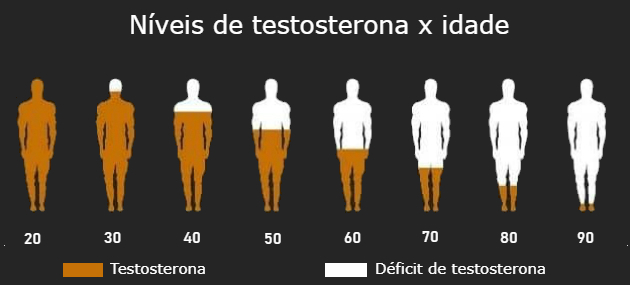Testosterone is the main male sex hormone, acting in different parts of the body and influencing behavior and physical and sexual performance.
This hormone acts mainly in the development of male reproductive tissues, such as the testicles and prostate. Furthermore, it is related to the production of muscle mass, bone health and hair and hair growth throughout the body.
Testosterone is considered a hormone that is related to well-being and health.
Testosterone Function

In the human body, testosterone acts in different ways and, if it presents changes, some symptoms are noticed.
Find out below how this important hormone in the male body works in the body.
- Motivation: Testosterone acts on the nervous system, contributing to energy production, concentration and mood.
- bone loss: as it is related to bone growth and development, testosterone can influence bone density.
- hair growth: testosterone production starts in men around 12 years old, representing the puberty male, which stimulates the growth of hair throughout the body.
- sexual desire: this is a behavior that is more related to the action of testosterone in the body, as it influences sexual desire.
- muscle development: As with hair growth, it is during puberty that muscles develop in men, as this is the beginning of the production of this hormone. However, it is between the ages of 20 and 30 that the blood testosterone peaks.
Testosterone production
Testosterone production is related to LH and FSH hormones. They are released by the pituitary and together exert their activities at the level of the testes, where LH acts on Leydig cells, stimulating the production of testosterone.
Cholesterol is the precursor to most sex hormones, as it reacts in the hormone-producing glands to become testosterone.
The production of testosterone in the body is not limited to men, women also produce this hormone, but in smaller amounts, with the same benefits and effects that occur in men.
To maintain testosterone production, it is recommended that you exercise frequently, sleep well, and keep your body weight balanced.
Foods that help testosterone production

The ingestion of some foods can contribute to increased testosterone production, see below what these foods are:
- Zinc Rich Foods: the main sources of zinc are from animal origin, oysters, shrimp, beef, chicken, fish and liver. Can also be found in vegetables, tubers.
- Vitamin D rich foods: the main sources of vitamin D are meat, fish and seafood, especially salmon, sardines and shellfish, in addition to dairy products and mushrooms.
- Foods rich in vitamin A: The main sources of vitamin A are egg yolks, fish oils and liver, but it can also be found in vegetables and fruits such as carrots, spinach, mango and papaya.
Testosterone deficiency in the body
Testosterone deficiency in the body can have different origins causing some reactions in the human body. The need for supplementation of this hormone must be made by medical advice from a blood test.
Several factors can be related to low testosterone in the body, the most common being:
- Lack of sexual interest;
- Frequent tiredness;
- Mood changes;
- accumulation of fat;
- Difficulty defining muscles;
- Little amount of hair on the body;
- Lack of sleep and restlessness at night;
- Brittle bones.
In addition, with advancing age, the testosterone level tends to decrease by an average of 1% per year from 40 years of age onwards. Thus, it is important that this hormone is regularly dosed, as a low dose may indicate some health problems.
Generally speaking, the testosterone level varies between 300 to 900 nanograms per deciliter of blood.

Risks of Excessive Testosterone Intake
Excessive testosterone intake is a practice that causes serious damage to health, being mainly caused by the use of anabolic steroids.
Testosterone is one of the main anabolics used, being harmful to use above what is necessary for the body. Testosterone ingestion must be performed by prescription and its use is controlled.
Also read about:
- Prostate
- muscular system
- Nervous system
- endocrine system



